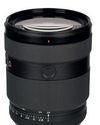Andy Westlake tries out Sony’s latest premium fast prime designed for Alpha 7 users.

Back in 2006, Sony took over Konica Minolta’s troubled camera business in a bid to become a major player in the market. Ten years on and its relentless experimentation and innovation have paid dividends, with the Alpha 7 full-frame mirrorless system rapidly establishing itself as a serious alternative to high-end DSLRs.
There’s no point having hugely ambitious cameras like the 42.4-million-pixel Alpha 7R II, though, without lenses to match. To this end, Sony has also been rapidly building up its full-frame FE range, which, from a standing start in 2013, now numbers 17 lenses as well as various converters. Its latest is the premium Zeiss-branded Planar T* FE 50mm f/1.4 ZA.
Sony’s marketing tagline is ‘Tomorrow’s lenses today’, and by this it means that it is designing optics to satisfy the requirements of not just the latest high-resolution sensors, but future generations as well. To this end, it has established a couple of premium lines, with its home-grown ‘G Master’ range exemplified by the recent FE 85mm f/1.4 GM. Somewhat confusingly, the line developed in partnership with Zeiss is essentially parallel, but the lenses have a specific balance of optical properties.
Whatever the design intention, it’s impossible to miss the new 50mm’s price. At £1,499, it’s more than double that of the existing Sonnar T* FE 55mm f/1.8 ZA, which, at around £620, is already very much a premium lens and has gained an enviable reputation for optical quality. In context, Sigma’s stunning 50mm f/1.4 DG HSM | Art for full-frame DSLRs is currently around £580, while Samyang’s new, directly competing FE-fit 50mm f/1.4 will cost just £449. So how can Sony conceivably justify such a wallet-busting price tag?
Features
Diese Geschichte stammt aus der August 20,2016-Ausgabe von Amateur Photographer.
Starten Sie Ihre 7-tägige kostenlose Testversion von Magzter GOLD, um auf Tausende kuratierte Premium-Storys sowie über 8.000 Zeitschriften und Zeitungen zuzugreifen.
Bereits Abonnent ? Anmelden
Diese Geschichte stammt aus der August 20,2016-Ausgabe von Amateur Photographer.
Starten Sie Ihre 7-tägige kostenlose Testversion von Magzter GOLD, um auf Tausende kuratierte Premium-Storys sowie über 8.000 Zeitschriften und Zeitungen zuzugreifen.
Bereits Abonnent? Anmelden

Calling The Shots: A Queer History of Photography
Offering an unprecedented view of photographic history through a queer lens, this is a wonderful and powerful book, says

Large-aperture standard zoom, too
SONY has also revealed a new premium standard zoom, the FE 28-70mm F2 GM.

Super-fast, high-res Sony Alpha Ai II
SONY has announced its new professional full-frame flagship camera, the Alpha A1 II.

39 awesome accessories
Our round-up of the best accessories we've used and reviewed this year, along with some old favourites. There's something here for every budget, starting from just £7, including tripods, bags, filters and much more

Such a thing as society
This autumn sees the launch of a major new book and exhibition devoted to examining the multiplicities of photography during 1980s Britain. Peter Dench finds out more

Join Club
The sociable Canvey Island Photographic Club is keen to grow its in-person meet ups

Capturing flight
Winners and finalists of Bird Photographer of the Year share their tips for success with Hollie Latham Hucker

140 years of change
AP has become the world’s oldest surviving consumer photo magazine because we have moved with the times, says Nigel Atherton

Preserving history in platinum
A deep dive into the meticulous art of platinum printing, and the collaboration between the Royal Geographical Society and Salto Ulbeek. Mike Crawford explores how they brought historical photographs to life with enduring beauty and precision

Life in the past lane
What was life like for an amateur photographer in 1884? John Wade takes a trip back in time